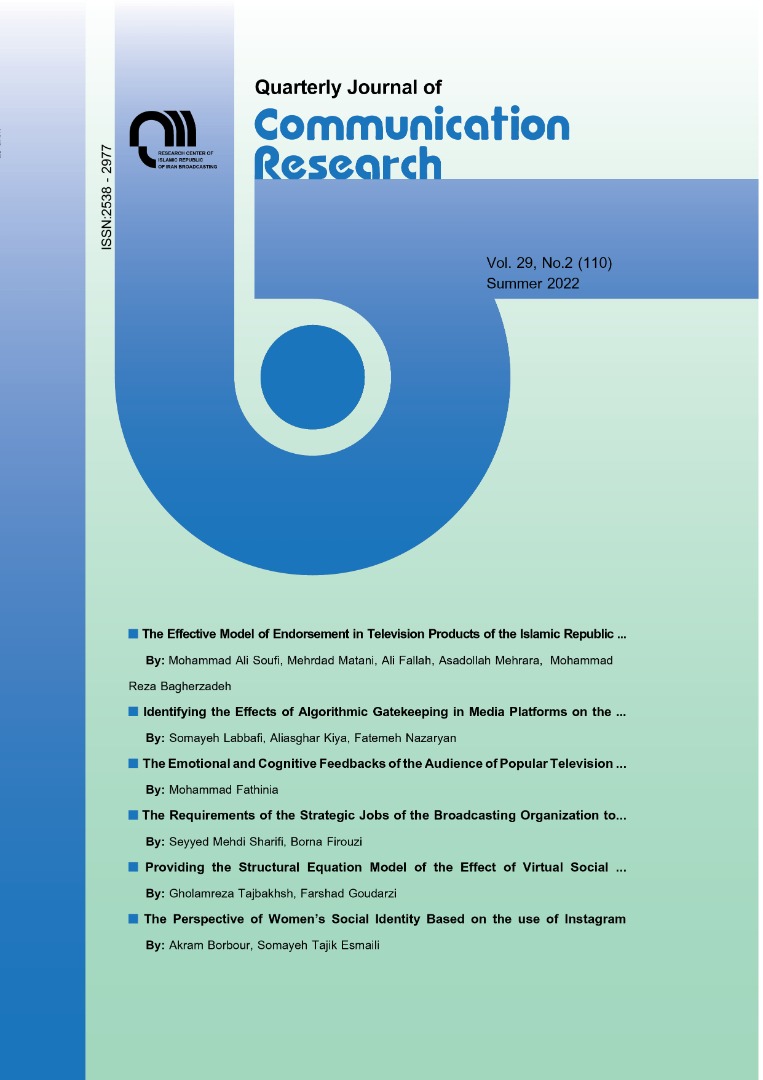Abdolhosseini, A. & Haghighatian, M. (2014). Investigation Of Social Factors Affecting Social Identity (Case Study: 15-29-Year-Old Youth Of Isfahan City). Sociological Studies Of Youth, 6(18).
Aghili, V. & Tajik-Ismaili, S. (2010). Comparison Of The National Identity Of Female Students Dependent And Not Dependent On The Internet (Chat). Journal Of Education, 26(2), 71-94.
Ahmadzadeh Kermani, R. (2011). Rethinking Culture And Media. Volume 1, Tehran: Chapar Pub.
Akbarzadeh Jahormi, J. & Ahmadi, A. (2019). Typology Of Virtual Identity Of Iranian Kurdish Women On Instagram. Journal Of Culture-Communication Studies, 21 (52), 111-144.
Batmani, L. (2014). Comparison Of National Identity Of Male And Female High School Students In Tehran. The First National Conference Of Educational Sciences And Psychology, Tehran.
Berger, P. & Lokman, T. (2002). Confused Mind, Modernization And Awareness (Savoji, M. Trans.). Tehran: Ney Pub.
Biabangard, E. (2005). Adolescent Psychology. Tehran: Islamic Revolution Publishing House.
Castells, M. (2002). Information Age: Economy, Society & Culture [The Rise Of The Network Society] Vol. 1 (Aliqolian, A. & Khakbaz, A. Trans.). Tehran: Tarh_E No Pub. (Original Work Published 1996).
Defleur, M. L. & Dennis, E. E. (2008). Understanding Mass Communication (Moradi, S. Trans.). Tehran: IRIB Pub.
Gibbins, J. R. & Reimer, B. (2009). The Politics Of Postmodernity: An Introduction To Contemporary Politics And Culture (Ansari, M. Trans.). Tehran: Gam-E No Pub.
Giddens, A. (1999). Sociology (Sabouri, M. Trans.). Tehran: Ney Pub. (Original Work Published 1989).
Giddens, A. (2008). Modernity And Self - Identity: Self And Society In The Late Modern Age (Movafaqian, N. Trans.). Tehran: Ney Pub. (Original Work Published 1991).
Giddens, A. (2009). The Consequences Of Modernity (Salasi, M. Trans.). Tehran: Markaz Pub. (Original Work Published 1999).
Hajiani, E. & Mohammadzadeh, H. (2014). Investigating The Effect Of Virtual Space (Internet) On Students' National Identity. Journal Of National Studies, 16(1), 67-84.
Iman, M. T. & Kizghan, T. (2003). Investigating Factors Affecting Women's Social Identity (Case Study Of Women In Shiraz). Journal Of Al-Zahra University Humanities, 12 (44-45), 107-79.
Jenkins, R. (2003). Social Identity (Yarahmadi, T. Trans.). Tehran: Shirazeh Pub. (Original Work Published 1996).
Karwani, A. (2017). Interaction In Virtual Space And Its Effect On The National Identity Of Sistan And Baluchistan University Students. Journal Of National Studies, 19(2).
Nejad Asghari, Z. (2015). Investigating The Effect Of Social Networks (Telegram) On Changing The Religious Identity Of Users. National Conference Of Women, Family And Virtual Social Networks. Iranian Women's Studies Association.
Nikkhah Qamsari, N. & Mansourian Ravandi, F. (2012). A Reflection On The Relationship Between Virtual Space And Gender Identity: A Case Study Of Intnet Users In Kashan City. Journal Of Media Studies, 9 (27).
Razavi, A., Esmaili, M. & Farrokhi, Nourali. (2009). Comparison And Analysis Of The Content Of "My Identity Values" Between 18-22-Year-Old Girls And Their Mothers. Journal Of Social Research, 2(5).
Rehbargazi, M. R.; Hatami, A. & Abbasi, A. (2017). The Relationship Between Virtual Social Networks And The Transformation Of Collective Identities (With An Emphasis On Religious, National And Modern Identity). Journal Of Majlis And Strategy, 25(95), 33-58.
Rezadoost, K.; Molai, J. & Tawafi, P. (2019). The Effect Of Globalization Dimensions On Gender Identity (Case Study: Youth Of Abdanan City). Journal Of Social Psychological Studies Of Women, 18(2), 43-80.
Rezaei, A. A. & Zohraei, M. A. (2011). Initiative In Planning And Evaluating Cultural Performance. Tehran: Yadavaran International Research And Publishing Company.
Safarinia, M. (2011). Social Psychology And Personality Tests. Tehran: Esteemed Book.
Safiri, Kh. & Arabpour, E. (2021). A Study Of The Lived Experience Of Motherhood And Wifehood Among Female Heads Of Households In Tehran. Journal Of Social Psychological Studies Of Women, 19(1), 44-7.
Sarukhani, B. & Rifatjah, M. (2004). Effective Sociological Factors In Redefining Women's Social Identity. Journal Of Women In Development And Politics (Women's Research), 2(1).
Shamani, E. (2015). The Relationship Between The Use Of Virtual Social Networks And The Identity Of Young People In Tehran. Journal Of Counseling And Psychotherapy Culture, 7 (28).
Shaygan, F. & Rostami, F. (2011). Social Identity And Sense Of Security (Case Study Of Tehran Women). Journal Of Welfare Planning And Social Development, 3(9), 149-182.
Slevin, J. (2001). The Internet And Society. (Gilory, A. & Radbawe, A. Trans.). Tehran: Ketabdar Pub.
Tomlinson, J. (2002). Globalization And Culture (Hakimi, M. Trans.). Tehran: Office Of Cultural Studies. (Original Work Published 1999).

